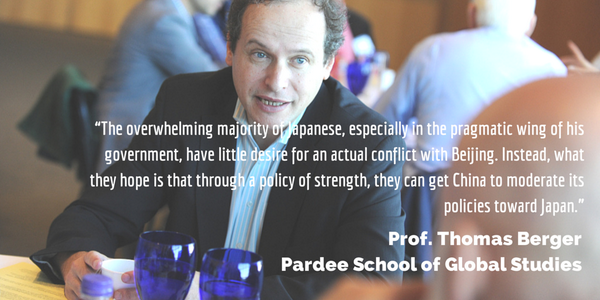Prof. Berger in NYT on Evolving Sino-Japan Relations
In speaking to The New York Times, Thomas Berger, a Japan expert at the Frederick S. Pardee School of Global Studies, says that “domestic and international concerns had prompted both countries to agree to disagree and get on with other business.”
The article, “China and Japan, in a Sign of Thaw, Agree to Disagree on a Disputed Island Group” (Nov. 7, 2014) reports on the announcement that China and Japan have agreed to talk on the issue of their competing claims on islands in the East China Sea and that they “would gradually resume diplomatic and security discussions.”
Prof. Berger is quoted in the article making the argument that Japanese Prime Minister Abe has domestic reasons to demonstrate that his “peace through strength” policy is working, and that China needs better economic relations with Japan as its own economy begins slowing down. He goes on to say:
“The overwhelming majority of Japanese, especially in the pragmatic wing of his government, have little desire for an actual conflict with Beijing. Instead, what they hope is that through a policy of strength, they can get China to moderate its policies toward Japan.”
Professor Berger added that Chinese Primier Xi was probably hoping to get credit internationally for moderating his position, while not making substantive concessions to Japan over the islands or other issues.
Thomas Berger is the author of War, Guilt and World Politics After World War II, Cultures of Antimilitarism: National Security in Germany and Japan and is co-editor of Japan in International Politics: Beyond the Reactive State. His articles and essays have appeared in numerous edited volumes and journals, including International Security, Review of International Studies, German Politics and World Affairs Quarterly.
